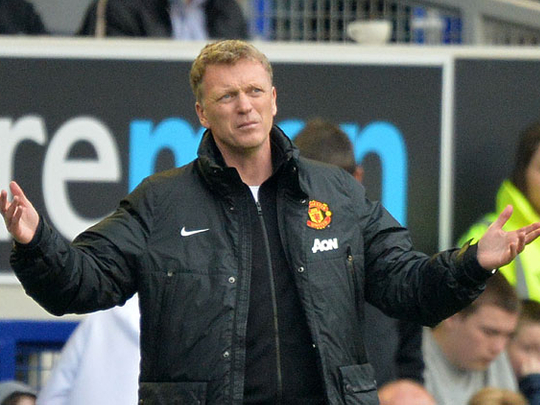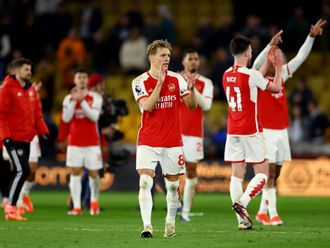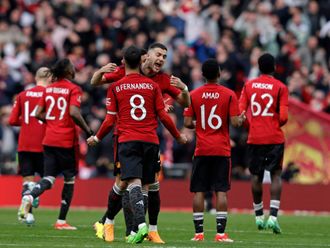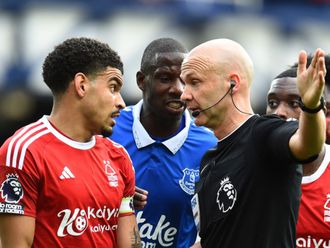
Manchester, United Kingdom: In Frank O’Farrell’s day, he started getting suspicious when he turned up for Bobby Charlton’s testimonial dinner and discovered that he was not even seated on the top table for a function he had organised himself.
It was the next day O’Farrell was summoned to Manchester United’s boardroom to be sacked and “A Nice Day for an Execution”, the relevant chapter of his autobiography, remembers how Matt Busby avoided eye contact as the chairman, Louis Edwards, broke the news. “It wasn’t so much I got the sack but the way they behaved as people,” O’Farrell wrote. “I can never forgive them for that they were nasty beggars.”
Wilf McGuinness ended up taking solace in a bottle of sherry when it was his turn. “It was as if the world had ended,” he recalled many years later. “I was demoralised, heartbroken, horribly hurt. I’m not ashamed to admit that, in those darkest moments of my career, I literally banged my head against the wall, several times.” Jack Crompton, the trainer, eventually found him, in a crumpled heap on the boardroom floor.
The break is rarely clean and for David Moyes nobody should make the mistake of thinking the payoff will prevent it being the most harrowing moment of his professional life. Moyes was the wrong man for the job; he just did not realise it. He will find future work, maybe even success, but his reputation will never fully recover. He will always be remembered as the man who took over from Ferguson and blew it. The modern-day McGuinness-O’Farrell, replacing a legend and, ultimately, falling so far short he will have to carry the consequences like a rucksack of bricks.
Plainly, it has been a difficult decision for United when it means abandoning everything they have always preached and going against Sir Alex Ferguson, the man who handpicked Moyes for the job and decreed that his successor, and friend, should get a six-year contract. The mind goes back to the opening night of Ferguson’s book tour, on an October evening at the Lowry theatre, and what he told his audience about the management profession. “It’s a terrible industry. When clubs sack a manager there is no evidence it works. But there is evidence, and it’s hard evidence, that sticking with your manager does work. This is an important issue and it is something I believe in, very strongly. Sacking a manager does not help.”
Out of comfort zone
But what if the manager is simply not up to it? Firing Moyes would not be an impetuous or shocking decision, and Ferguson will just have to live with that. Even taking into account United’s determination to go by their own rules, and their distaste for football’s sacking culture, it has become abundantly clear Moyes is out of his comfort zone, drowning under the weight of his work. “The Chosen One” the banner read. But Moyes was not the right choice and that is the awkward truth for Ferguson. It was a serious lapse of judgment that might have put United back years.
The slump for that is what it is has been too extreme for a club of United’s ambitions to allow it to go too much further and Moyes can hardly complain when, at any of their major rivals, he would never have reached Easter. Or maybe even Christmas. “David Moyes, in Italy, would have been sacked three times by now,” Gianluca Vialli said in February. And since then, United’s season has unravelled even more spectacularly.
That plodding defeat to Everton on Sunday means Moyes’ team have lost, home and away, against both Merseyside clubs for the first time in the club’s history and are guaranteed their least accomplished points total of the Premier League era. Manchester City have thrashed them twice. Newcastle have won at Old Trafford for the first time since 1972, and Swansea for the first time in their history. Stoke had not beaten United since 1984 until this season and West Bromwich had not won at Old Trafford since 1978. It has started to seem like a deception that this club won their 20th league title by 11 points last season. The Moyes era, to put it bluntly, has been awful beyond anyone’s expectations. Even before we get to the fact there is a banner at Anfield these days saying “Back on our perch”, with everything that means for the club looking up from seventh position, 23 points behind, with their shoelaces tied together.
Brendan Rodgers is one of the managers whose tactical expertise has made Moyes look stodgy and better suited for a club with lesser ambitions. Roberto Martnez, who replaced Moyes at Everton, is another. When Moyes said United had produced outstanding football at Goodison, the perplexing thing is that he actually sounded like he meant it. When they were losing 2-0 and conspicuously short of ideas, his assistant, Steve Round, produced a ring binder entitled “set-pieces” and it was tempting to wonder whether they understood this club, with its history of spontaneous brilliance, and the first requirement of genuinely exciting football.
Dressing room truth
A lot of the analysis will inevitably feature on the way Moyes has “lost” the dressing room. The truth is actually that he had never had the dressing room. Not properly anyway. Rio Ferdinand and Nemanja Vidic, important players at Old Trafford, could never be won over. Ryan Giggs, who understands the place as well as anyone, has been thinking about not just retiring but also quitting his coaching role and walking away from the club altogether.
When senior players rebel, younger ones follow. Danny Welbeck, the only other Mancunian in the squad, has just let it be known that he wants a move. Even that, in isolation, seems typical of the new United, with the story leaked on the morning Moyes faced his former club just another demonstration of his lack of control and authority.
Just before the news broke that United intend to fire him, a supporters’ poll on the Red Issue website had only 6% wanting him to survive the summer. The crowd might not have universally approved of the plane that flew a “Moyes Out” banner over Old Trafford recently indeed, many jeered it but that was more an issue about how they should go about making their discontent known. Moyes should just be glad it has never manifested itself in a full-on mutiny when that, feasibly, would have hurried up this whole process.
As it is, there are no apologies to be made for reiterating that United made a poor call deciding that a manager with no trophies or Champions League experience was superior to one who had won seven league titles in four countries, the European Cup with two clubs, the Uefa Cup, the FA Cup, two League Cups, the Spanish Cup and the Italian Cup, among other things.
Jos Mourinho, an authentic trophy machine, once went nine years without losing a home game and also has 20-odd recognised manager-of-the-year awards to his name. Yes, he can be an incredibly self-centred twerp at times, as we saw at the weekend. But so could Ferguson, frequently, and everyone in football knew Mourinho wanted the job. The counterargument is that he does not usually last beyond a certain time-frame whereas United wanted a long-term appointment. So let’s say, hypothetically, he had stayed four years. They would have been a brilliant, trophy-laden four years.
Instead, Moyes will be informed that he has missed every realistic target that had been expected of him. No other manager has taken a team from first to seventh since Ray Harford at Blackburn Rovers in 1996 and it will be 17 months, minimum, before United are a Champions League club again. The bottom line is that a club this size has too much at stake to tolerate that kind of under-achievement, whether Ferguson agrees or not.
— Guardian News & Media Ltd











